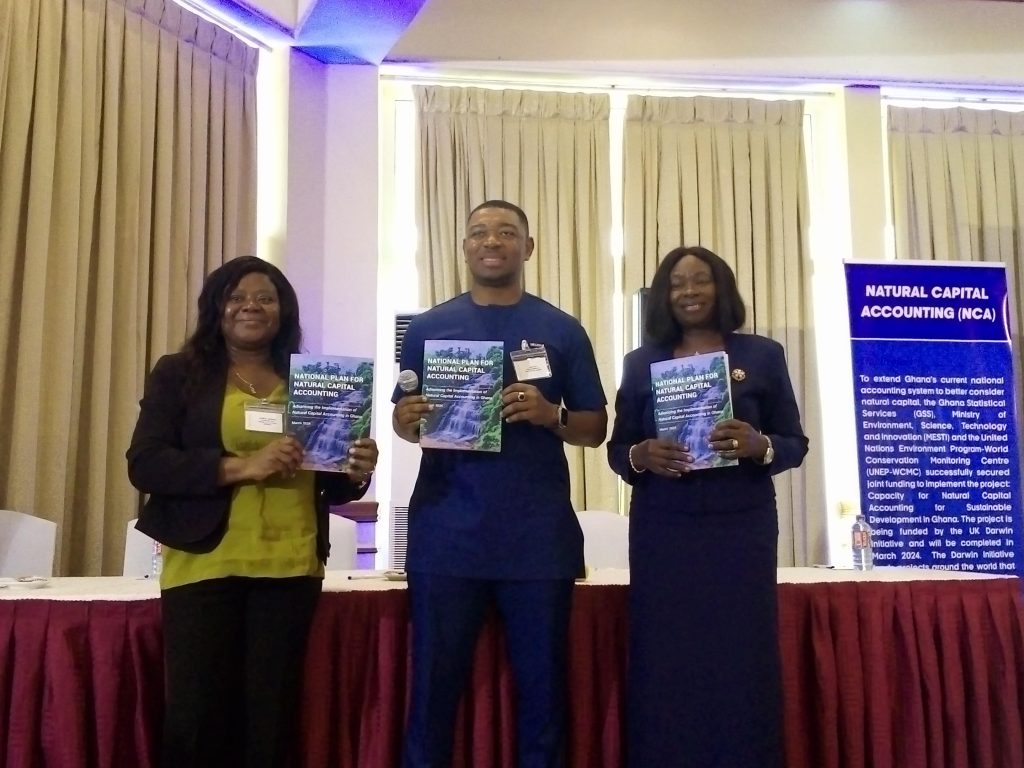By Benjamin A. Commey
Accra, March 20, GNA – The Ghana Statistical Service (GSS) has launched a National Plan to track the contributions of the country’s natural resources to the economy and ensure sustainable development.
The Plan, known as the Natural Capital Accounting (NCA), will provide insights into natural resources income and the impact of the economy on the resources.
Also, it will help mainstream ecosystems and biodiversity into national accounting and inclusive economic development planning to support livelihood and poverty alleviation interventions.
The Plan was developed in collaboration with the Environmental Protection Agency (EPA), the Ministry of Environment, Science, Technology and Innovation (MESTI) and the United Nations Environment Program-World Conservation Monitoring Centre (UNEP-WCMC), with funding from the United Kingdom Darwin Initiative.
NCAs are a set of objective data on the stocks of natural resources, including environmental assets and the flows of benefits they provide.
Their aims are to provide detailed integrated statistics on how natural resources contribute to the economy and how the economy affects natural resources.
Speaking at the final stakeholder consultation workshop on Capacity in NCA for Sustainable Development and the launch of the Plan, in Accra, on Wednesday, Dr Bernice Serwah Ofosu-Baadu, Head of Agriculture and Environment Statistics at the GSS, said the Plan was critical in understanding the contribution if the country’s green economy to its Gross Domestic Product (GDP).
She noted that over the years, the country’s rich diverse natural resources and biodiversity had fed into its production process, however, none of the findings from the production process had discussed the depletion, deforestation or environmental losses of the country.

“We produce Gross Domestic Products but it doesn’t include the effect of what it costs to the environment. For instance, GDP is more of production, if you want to produce mining, you just go and deplete the environment and pick the gold and other things, but the cost to the environment is not being accounted for.
“So, this green GDP is supposed to account for these losses – the environmental losses, the degradation, the depletion of so that when we get the total, we just negate it from the total GDP that we have then we can get green GDP,” she said.
She added that the NCA was such an “account that will help us know what is sustainability or how sustainable our environment is, how sustainable our natural resources are for our future use.”
The NCA comprises a number of accounts from the various natural resources sectors such as land accounting, fishing and aquatic resources, waste accounting, environmental goods and services, environmental protection expenditure accounting and water accounting.
Mr Abdul Hanan, Deputy Director of General Services, EPA, said natural capital comprising land, water, air and forest, underpinned Ghana’s economy and was the bedrock for its prosperity and wellbeing.
He explained that over the past few years, the country’s food and water systems, forest, biodiversity and overall well-being, had been threatened by environmental challenges, indicating that while commendable efforts had been made to ensure proper management of these assets, access to reliable, timely and standardised data, to inform decisions at all levels, was critical.
“The inadequacy of traditional metrics like the GDP to capture the full spectrum of the value of natural capital in Ghana underscores the urgency and need for robust and integrative valuation and accounting framework – thus strengthening capacity in NCA is paramount and in the right direction,” Mr Hanan said.
While affirming EPA’s commitment to the NCA, he called on stakeholders to help chart a cause towards a future where natural resources of the land were valued and better managed for the benefit of all.
Mrs Esi Baadah Quayson, Director of the Fisheries Commission, welcomed the NCA, explaining that natural capital particularly, the fisheries resource contributed immensely to the country’s economic development – providing food security, wealth creation, poverty alleviation and GDP.
However, she noted that the sector was faced with a lot of challenges, including overcapitalisation, unsustained exploitation and utilisation, climate change, and Illegal unreported unregulated fishing, which threatened its sustainability.
“These challenges for me, must be a cause for concern for everyone as it threatens the economic foundation of fishing communities, the nation as a whole and the competency and integrity of the aquatic ecosystems themselves,” she said.
She called for a concerted effort to ensure sustainable fisheries and biodiversity preservation.
GNA